Thomas E. Ricks's Blog, page 88
September 26, 2013
The Army shouldn't cut back on training in how to confront a live, thinking enemy
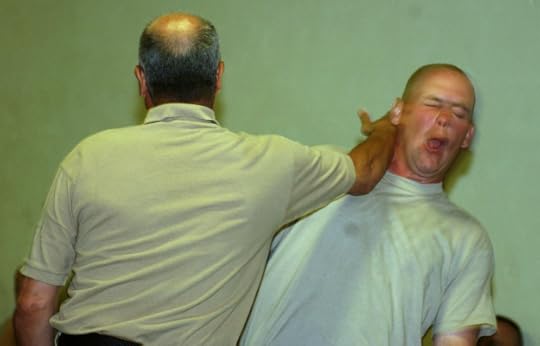
By
Capt.
Paul
Lewandowski, U.S. Army
Best Defense guest columnist
Earlier this month,
the Army Times reported that
Combatives, the Army's program for teaching hand-to-hand combat, was being
scaled back from four multitiered intensive training courses to a single
two-week master trainer course. These cuts, on top of a de facto moratorium on
Combatives competitions, effectively mark the end of Army Combatives as a major
program. The dissolution of Combatives is endemic of a larger problem
throughout the military -- the fact that training for compliance is
overwhelmingly favored over training for effect.
For many leaders,
the reduction in Combatives certification requirements seems like a godsend. No
longer must commanders send capable soldiers and NCOs to Combatives courses for
weeks at a time. They now need only send a single NCO, and in two weeks he or she
can provide all soldiers in the unit with the required training at the minimum
standard. That commander can update the unit's spreadsheet to show "Combatives
training" as "green" for another a year. For a brigade support battalion or
aviation maintenance company, hand-to-hand combat skills appear useless, and
Combatives training takes valuable time away from soldiers executing their
assigned duties within the unit.
In the view of many
commanders, all training is simply a form of regulation compliance. Training
tasks are dictated by a plethora of protocols specifying what is to be trained
and how often. Everything from equal opportunity training to cold weather
injury prevention is prescribed at the Army level, and every unit is required
to maintain extensive name-by-name records. The core theory behind this
compliance-oriented training is that there are only two kinds of soldiers in a
unit: those who have received the training to the minimum standard, and those
who have not.
In certain tasks,
providing soldiers the minimum standard of training in accordance with clear,
published, specifications is the best and most effective method. However, there
is a disturbing trend in which more and more training is being treated as
"regulation compliance." Reporting the results of training on a spreadsheet or
PowerPoint slide captures the effect of training only in the most narrow,
linear sense. It treats the soldier who sleeps in the back of the classroom and
the soldier practicing until his/her hands are callused as one and the same.
Effective military training has an incredible transformative power that cannot
be articulated within a slide deck -- such as when a squad finally develops the
camaraderie to be a high-functioning team, when a young soldier understands that
his/her responsibilities aren't a burden but a source of pride, or when a young
lieutenant finds the courage to lead by example. Training has the power to do
more than alter a slide -- it can alter a soldier.
Combatives training
is a sterling example of transformative training. The basic Combatives course
is 40 hours of instruction almost always done as consecutive eight-hour days.
The course curriculum is physically demanding, with virtually no conventional
classroom time. It is extremely taxing on soldiers' bodies and minds. To
graduate Combative level I, students engage in roughly two hours active
fighting against one another. Students also must execute a "clinch drill" in
which the soldier closes with and takes down a trained instructor who, meanwhile,
is actively striking the student in the head and body. The instructors wear
boxing gloves but the only protective equipment for most soldiers is a
mouthpiece. The vast majority of students report these two aspects of the
course -- the active combat against other students and being hit full force
while achieving the clinch -- as the two most harrowing, yet rewarding, aspects
of the course.
This type of
intensive training offers each individual soldier an unscripted version of
combat. Virtually no other training pits individual soldiers against a
reactive, intelligent, aggressive enemy. National Training Center rotations,
field problems, and tactical lanes all are structured as plays, where the
"enemy" is actors following a pre-written script. This type of structured
training is important for testing systems and equipment, but as the military
has seen over the past 12 years, the enemy doesn't behave like an actor
following a script. The enemy is innovative, aggressive, and at times
inscrutable. In short, the enemy on the battlefield behaves much like a
Combatives opponent. This is because Combatives, at its core, is warfare -- human beings vying for
dominance of an environment. Combatives training puts soldiers in an emotional
state very similar to what they face in combat -- and it trains them to
function through it.
Combatives training
develops the hard-nosed, gritty, courageous mentality every soldier, regardless
of function or position, needs to possess. Soldiers who pass the Combatives
course know how to keep functioning when their bodies tell them to stop; they
know how to fall back on their training when fear starts to set in, and how to
swallow their pride and move forward when they've had a setback. Combatives
course graduates are the best mechanics, operations NCOs, and infantrymen -- not
because Combatives gives them more skills in their respective duties, but
because it teaches them to execute their duties to a higher level or performance.
These types of results -- producing soldiers who become more capable in every
aspect of their careers -- are what intensive, effects-oriented training can
achieve.
It is telling that
the Army views a program like Combatives, for which the benefits are real but
unquantifiable, as disposable. It is indicative of a move away from training
for effect, and toward a "train to the test" Army. The heart of the problem,
and its solution, lies with commanders who expect and demand compliance with
every single published standard. Leadership is setting priorities -- choosing
to execute some training and not others. Superiors must support their
subordinates' efforts to conduct the training that will produce the most
mission-effective unit, not the most effective slide deck. This is an easy idea
to espouse, but when the time comes, a commander will have to stand in front of
his or her superior and explain that cold weather injury prevention, or traffic
safety training, is going to be staying at "zero soldiers trained" for the
foreseeable future. In the culture of the Army today, that is an act of moral
courage.
Leadership is
choosing a course of action and leading subordinates in its execution. It means
looking for training that transforms soldiers and units. When every training
task becomes a priority, then nothing is a priority. If the Army continues to
sell out effective training in favor of expedient training, we have to ask
ourselves: What kind of soldiers will we be sending into the next war?
Paul Lewandowski is an active duty Military Police captain
and Operation Enduring Freedom veteran. He represented Fort Riley at the 2011
All Army Combatives Championships. This essay represents his personal views and
are not necessarily those of the MP Corps, the U.S. Army, or the Department of
Defense.
September 25, 2013
Ethical leadership: Let's talk about victims in the Marine urination case
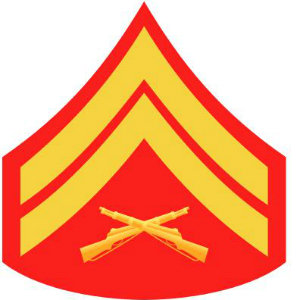
By Jim Gourley
Best Defense all-star team
Last week's posts on
this blog regarding the moral dimension of military leadership fostered lively debate among readers. The opinions
written represented the entire spectrum of academic and personal viewpoints.
However, as it always goes with such discussions, it always comes back to
action. Whatever improvement the discussion provides to our ethical calculus
and however flawed it remains, we never have the luxury of establishing the
times and places in which we make the difficult choices. As Donald Rumsfeld
said, you go to war with the military you have, not the one you wish you had.
And so this week
presents the American military with another demonstration of at-best-flawed
ethics in leadership, this time from none other than the commandant of the
Marine Corps. In an exclusive report, the Marines
Corps Times reveals the plight of Corporal Rob Richards, one of four
Marines who were shown urinating on the bodies of Taliban fighters his scout-sniper
group had recently killed in early 2012. Corporal (then Sergeant) Richards was
severely injured during the Battle of Marjah in 2010. His physical recovery
required a half-dozen surgeries. He experienced extreme flashbacks and was
prescribed what the Times described
as a "cocktail of medications that included painkillers and Valium."
He quit his meds abruptly after joining 3/2 to prepare to deploy with them less
than a year after the attack that had injured him so badly.
Cpl. Richards told the Times that his unit recorded 320 kills
during that deployment. He was also part of several details sent to retrieve
the bodies of Marines killed in action. The Taliban deliberately hacked some of
the dead into pieces and booby-trapped them with bombs. In one case, a Marine's
leg was hung from a tree to mock them. The man responsible for these horrors
was among the dead that Richards and his compatriots desecrated.
What has happened
since the video was released offers endless points of contention. Some will
focus on the miraculous escape of Lt. Col. James B. Conway (son of retired
Commandant General James T. Conway) to a command assignment, while the company
commander faces charges of dereliction of duty and then-battalion commander Lt.
Col. Christopher Dixon has been put on ice until the investigation closes.
Others will point fingers at Amos for exerting undue influence by first telling
the convening authority, Lt. Gen. Thomas Waldhauser, that he wanted Richards
and his fellow Marines "crushed," then removing Waldhauser from the
case entirely. Waldhauser had proposed measures to work around courts-martial.
Though he'll find
plenty of wiggle room to argue he committed no crime, the appearance of
impropriety alone is sufficient to say that Amos has failed to meet the ethical
standard of the office to which he has been trusted. But this is only one
snowflake on the iceberg. There are bigger questions that should be asked.
Where was the care
and attention that should have been paid to Corporal Richards's drug regimen?
Why did no one follow up when he did not come back for prescription refills?
Where was the awareness and consideration of 3/2 Marines during their initial
efforts to bring Corporal Richards into their unit? What decision-making
process led them to conclude that someone so recently and severely injured was
a good choice to bring into the unit? Were they simply out of options? Was
there a pervasive fear that asking for someone more fit for duty would get them
labeled a "problem unit?" How did their scales balance truth and
power? What measures were being taken to counsel Marines on the battlefield
taking part in such disproportionately numerous killing? Did leaders foster a
unit environment in which it was okay to talk about such things? Were there no
outlets for such egregious pent-up fear and rage other than urinating on
corpses? We sent Corporal Richards to Afghanistan and broke him physically and
mentally. Then we patched his body, doped his mind, and sent him right back
into a horror movie where he watched death and atrocity on a daily basis. The
available data on what happens in cases like these took this incident beyond
the realm of foreseeable outcomes and into foregone conclusions.
And ultimately, what
great strategic end was served by the deaths of the 320 men
Corporal Richards's
unit killed and the six Marines and one Corpsman whose lives were sacrificed?
This last question is hardly esoteric, and no less relevant to the discussion
than any other. The fundamental reason and common refrain in the USMC's
prosecution of this case has been the "damage done to the mission" by
the discovery of the act. If this is the case and the punishment for such
damage is the end of a Marine's career, what should the punishment be for
devising an unwinnable mission and then pursuing it in ways that are wasteful
and counterproductive?
General Amos has
been either the second- or highest-ranking officer in the Marines for nearly
half of America's 12-year slog through Afghanistan. Certainly he owns more
culpability in any damage to the mission than Corporal Richards. Furthermore,
for every step along Richards's path to that fateful day in 2012, Amos owns at
least a degree of the blame for the failures in Marine Corps leadership.
"Commanding officers never delegate responsibility," Amos told the
Senate Armed Services Committee this June. "Commanding officers are
charged with building and leading their team to withstand the rigors of combat
by establishing the highest level of trust throughout their unit. Unit commanding
officers set the command climate."
In the prior
academic discussion, Lt. Cols. Fromm, Pryer, and Cutright argued that the
greatest threat to military ethics is the "sloganeering" of values.
They might argue now that "the leader is ultimately responsible for
everything the unit does or fails to do" is the victim in this case. For
what more ultimate leader does the U.S. Marine Corps have than Amos, and what
blame has he accepted in the case?
But the
philosophical view is wrong. This is not an academic discussion, and the real
victim in this case is Corporal Rob Richards. He's a United States Marine.
Jim Gourley, a former Army infantry and intelligence officer,
is a journalist and author. He is a regular contributor to Best Defense.
Amb. Crocker and Prof. Bacevich talking about Syria -- but thinking about Iraq

By Stuart Montgomery
Best Defense defense seminars bureau
A recent panel at Georgetown University was supposed to be about Syria, but it
turned out to be about the lessons of the American experience in Iraq, seen in
light of the possible use of American force in Syria.
Ambassador Ryan
Crocker, who served in Iraq and many other Mideast posts, opined that we don't
know if Iraq was worth it yet. He said that we do know that we have paid
a large price, in both dollars and blood, to build a relationship with Iraq and
put it on the right trajectory.
Professor Andrew
Bacevich's opinion on the Iraq War was more concise: no, it was not worth
it. Examining the war through a Clausewitzian lens, he argued that the
war's original aims were not met. That is, the United States didn't find
any weapons of mass destruction, and the war's later objectives were murky and
amounted to a mission beyond what the military should handle: changing the way
people live.
When the conversation
turned to Syria, the panelists' comments had a common theme: restraint and
limitation. Crocker emphasized the unintended consequences that accompany
war and the need to understand other countries and their "ground rules." He
said we don't understand all the parties involved or the situation in its
entirety. The best option, he said, is to contain the conflict in Syria from
spreading throughout the region, and to provide assistance to the refugees.
Both panelists argued
for reconnecting military action to political discussion. Bacevich highlighted
the current absence of civil-military dialogue in our nation. Crocker
noted that Clausewitz taught that war is a continuation of politics, and so the
end of war must be a return to politics. He emphasized that war must be thought
of in the full extent: Why we are fighting, what we desire to accomplish, and
how we plan to end the war?
A secondary issue was
how Iran may perceive the outcome if the United States declines to intervene in
Syria. Here again the panelists emphasized the need for restraint, and Bacevich
emphasized the need to develop a deterrence posture. Both men noted that, after
12 years of war, the nation is not just tired of war and tired of paying for
it, but also questioning the value of war. We still haven't fully
answered that question about Iraq, and current public opinion is not in trying
to find new answers in Syria.
All power to the Constitution: What Tom meant to say about Amb. Power's speech

By John H. Haas
Best Defense guest respondent
Tom recently confessed to being bothered by U.N.
Ambassador Samantha Power's speech on Syria of September 6, in which she said,
"The American people elect leaders to exercise judgment, and there have
been times in our history when presidents have taken hard decisions to
use force that were not initially popular, because they believed our interests demanded
it."
Tom responded, "Power's stance is
profoundly undemocratic. The American system is founded on the belief that the
people do indeed know what is best for them. So I conclude that Power's
argument is itself yet another reason not to intervene in Syria -- if we have
to erode our system to do it, it certainly is not worth it."
Tom's discomfort with what has been called
"the imperial presidency" is understandable, and is widely
shared by smart, thoughtful, careful people on both the left and the
right. It has an intuitive appeal to anyone who's instincts have been
shaped by democratic principles. If our republic is just that, a res publica, or "public
thing," then shouldn't the public have a say in what its "thing"
does in the world? And what could be more morally momentous and
practically consequential than a violent attack on another nation that will extinguish
lives, and may suck the republic into a wider war?
In our current debate over an attack on Syria,
Republicans in particular have been forthright that the Constitution gives the
president no authority to do any such thing without congressional approval. California Republican Rep. Tom McClintock: "If a president on his
authority and in direct contravention of the Constitution plunges our nation
into war, if that's not impeachable, what is? The Constitution does not
require consultation. It does not require informing Congress. It requires
Congress' specific act to authorize a war." Republican Rep. Walter Jones
of North Carolina: "... any president who bypasses the Congress to bomb
another country without provocation, and this is actually in the Constitution,
then they should be impeached."
For his part, President Obama agrees: "The president does not have power under the Constitution to unilaterally
authorize a military attack in a situation that does not involve stopping an
actual or imminent threat to the nation." Well, agreed. That
was in 2007. Now? "I believe I have the authority to carry out this military
action without specific congressional authorization..."
To complicate matters further, Republican Rep.
Peter King of New York agrees with the Obama of 2013, and thinks he's actually wrong to seek congressional
authorization: "President Obama is abdicating his responsibility as
commander-in-chief and undermining the authority of future presidents. The
President does not need Congress to authorize a strike on Syria."
Well. We would seem to have something of a pickle here, as Uncle Billy might say. Who's
right? The Obama of 2007, or the Obama of 2013? Obama's Republican
critics, or Obama's other Republican critics? Samantha Power,or Tom
Ricks?
It seems to me that we have at least three
avenues of investigation that we need to consider as we search for an
answer. First, there is what the framers put in the Constitution
itself. There are also the framers' intentions, as revealed by what they
wrote elsewhere, and by what they did when they held office. And then
there's the subsequent historical record -- the body of precedent that
constitutes America's "unwritten constitution."
Let's start with those most basic of facts, the
numbers. A few years ago, Yale historian Harry Stout added up all of America's military
operations
and found 280 foreign interventions, along with 29 Indian wars. We'll
leave the latter aside, and we'll also admit that many of those
"operations" don't look a lot like "wars" from a
chronological distance (but then, neither would Obama's proposed "limited
attack" on Syria in a few years -- unless you were on the receiving end).
Of these, five have been formally declared wars,
and on another 13 occasions Congress has issued an expressed authorization of
military force. John Yoo counted 125 occasions of presidents ordering
military operations without congressional authorization.
What do those numbers tell us? It would be
hard to argue that a formal declaration of war is required. From the
earliest years of the republic, presidents have gone to war without a
declaration. Founding fathers John Adams (the Quasi War) and Thomas Jefferson
(the Barbary Wars) did, representing the two political parties then in
existence (the Federalists and the Democratical-Republicans). Congress,
with many of the signers of the Constitution on board, approved of these wars,
and no move to impeach either of them was made. If a formal declaration
of war is required by the Constitution, these gentlemen would have known about
it. Most scholars agree that the Constitution does not specify what
counts as a "declaration of war," and that authorizations of force
are legitimate equivalents.
We also might note that a formal declaration of
war is no guarantee that later generations will agree that the war was wise, or
just. Of our five declared wars -- the War of 1812, the Mexican War, the
Spanish War, World War I, and World War II -- only the last escapes serious
moral censure from mainstream critics. "I do not think there was ever a more wicked war than that waged by the
United States on Mexico," said Ulysses S. Grant -- and he was a veteran of that
war.
Similarly, regrets trail in the wake of many of
our congressionally authorized wars. We might wonder, for example, about
the necessity of Buchanan's attack on Paraguay in 1859, or Wilson's occupation
of Veracuz in 1914, or his wading into the Russian civil war in 1918, or the
wisdom of the Tonkin Gulf Resolution of 1964 that gave us Vietnam. Reagan's disastrous, tragic, and pointless incursion into Lebanon in 1983 was
authorized by Congress with healthy majorities. Most recently, George W.
Bush received overwhelming congressional support for Operation Iraqi Freedom.
At the same time, several congressionally
unauthorized attacks are relatively uncontroversial -- the Korean War ordered
by Truman, Reagan's incursion into Grenada and his attack on Libya, the first
Bush's invasion of Panama, and Clinton's 78-day war in Kosovo -- at least when
judged by the standard of popular approval. Indeed, one of them is among
the most admired examples of presidential leadership in recent history: the Cuban missile crisis of 1962. Facing no actual or imminent attack,
President Kennedy ordered a partial blockade (an act of war) against Cuba,
initiating the most dangerous confrontation between major powers in world
history. In the judgment of one historian, this confrontation over the
Soviet missiles based in Cuba was essentially a contest for "prestige." It is unclear
whether, had Congress or the American people been consulted, they would have
agreed that the mere presence of nuclear missiles 90 miles off our coast was
worth risking nuclear holocaust -- especially if it had been explained that the
Soviets had been deploying
submarines armed with nuclear missiles since 1955, arguably rendering the
Cuban question tactically moot.
We need to beware of reading too much into these
events. Neither the fact that a majority of our nation's military
operations were initiated and fought without either formal declaration or
congressional authorization, or that many of those that were declared or
authorized were mistakes, or that some that weren't authorized seem to most
Americans successes, neatly decides the question. The Constitution and
what it says, as well as the founders' intentions, remains critical. However, we do need to acknowledge that America -- not just presidents -- has
behaved as if neither declaration nor authorization was necessary on numerous
occasions. In no instance has there been a congressional or popular
outcry that jeopardized any president with impeachment for his actions. We seem, as a nation, to have made our peace with this arrangement. Whether we should have is another question.
Does the Constitution mandate that we withdraw our
approval of this arrangement and institute a requirement that presidents ask
for and receive congressional authorization before going to war? Even the
War Powers Resolution of 1973 -- passed by the congress most hostile to the
imperial presidency in our history -- doesn't say that. It only requires
that presidents get congressional authorization or terminate the operation
within 60 (or 90 -- depending on conditions) days. (No president has ever
admitted the resolution's authority, and no president has ever been impeached
for defying it--as, arguably, Clinton and Obama have done, in Kosovo and Libya
respectively.) It is significant that even the 93rd Congress did not
appeal to the Constitution's enumerated power to declare war, but to the "necessary and proper" clause, as its
justification for limiting the president's power to wage war.
Moreover, Congress did not move to impeach
President Nixon for continuing the Vietnam War even after it had repealed the
Tonkin Gulf Resolution in 1971.
Reps. McClintock and Jones, then, are surely
mistaken. And it appears the Obama of 2007 was also wrong. A
president may indeed "unilaterally authorize a military
attack." If, in the aftermath, it were discovered that there was no
threat to the nation -- and especially if it was discovered that the president
knew there was no threat -- that might constitute very good grounds for
impeachment. Yet -- again, arguably -- there was no clear
"threat" to the United States, as threats are conventionally
understood, that necessitated the wars in Korea, Vietnam, Panama, Kosovo, or
Libya.
We swim in deep waters here. The War
Powers Resolution explicitly denies that merely funding a war constitutes de facto
authorization. Many would
argue -- against the case I've made -- that failing to even try to impeach a
president similarly should not be interpreted as anything like approval. There are many reasons we might not want to impeach a president, even if he is
guilty of a minor misdemeanor like starting an unauthorized and unnecessary and
unjustifiable war.
But what about Tom's contention? The finer
points of constitutional law aside for a moment, does a president launching a
unilateral attack when the public's disapproval of that attack is known violate
the spirit underlying the Constitution, if not its letter? Is it the case
that the "American system is founded on the belief that the people do
indeed know what is best for them"? Would such an attack "erode
our system," and so should not be ordered?
Many readers will recall the slogan of the late
1960s, "Power to the people!" Some might recall the slogan
evolving into a more comprehensive, "All power to the people!" While both the SDS, then, and the Tea Party, today, evidence an
affection for this sentiment, it is not one that the founders shared.
At the end of the day, of course, the people are
sovereign and have the power to alter the republic in profound ways. Presidents and congressmen (and since 1913, senators) have to submit themselves
regularly to the will of the people as expressed in elections. In the
meantime, the Constitution grants them much freedom of action. If they
act in ways the people do not approve of, they can be tossed out. They
can be impeached. The people can alter the Constitution in any way they
see fit by amending it, thus restricting their powers. So, ultimately,
our system is grounded in the will of the people.
But that is not to say that it's grounded in the
belief that "the people ... know what is best for them." The
founders placed the selection of the president not directly into the hands of
the people, but into those of the electoral college. They denied the
people the power to directly elect senators, whose advice was required when a
president makes treaties and appoints ambassadors. The founders also
operated within a system that restricted the franchise much more tightly than
today, allowing only adult white males who met property requirements (and who
were, therefore, presumably educated and responsible) to vote. Theirs was
a hierarchical society, in which men were presumed to know what was best for
their wives and children, gentlemen were presumed to know what was best for the
commoners, and rulers knew more about what was "best" than the ruled.
But those weren't their only convictions. They were well aware, from history and experience, that even representative,
regularly accountable, impeachable rulers could go astray when it came to the
momentous issue of war. And so, in their sublime system of checks and
balances, they included an escape hatch from war, and brought it as close to
the people as they could.
The president, as commander in chief, has
immense power. They gave him the power -- "energy in the executive," Alexander Hamilton
called it -- to act swiftly to meet national emergencies. This they
believed was necessary, not because they were naive about executive power and
its potential abuses, but because they lived in a dangerous world. So
they maximized the president's power to meet military threats.
But the Constitution also balanced that
power. Among Congress's powers as enumerated in article I, Section eight,
is the requirement that "no Appropriation of Money" to raise and
support armies "shall be for a longer Term than two Years." Here is where the people get their veto. If the president -- even if he
has congressional authorization, even if he has a formal declaration of war -- cannot
convince the people that his military actions are justified, they can simply
vote out their current representatives and vote in new ones that will defund
his war. It is significant that they placed this power in the House,
where the people are most closely represented, and where elections are most
frequent.
The founders believed that even propertied and
educated gentlemen might not understand enough about world affairs to be counted
on to immediately make the correct decision. So they gave that power to
the executive. But they also believed that if the case held water, it
should be possible to persuade the people of it over time.
Would they have the same confidence if they
could see our more broadly defined "people"? In his farewell
address, President Eisenhower warned
that only "an alert and knowledgeable citizenry" would be up to the
task of guiding our leaders as they navigated the dangerous shoals of the
post-World War II era. Do we have "an alert and knowledgeable
citizenry"?
One of democracy's sincerest admirers, Alexis de
Tocqueville, confessed that, "As for me, I will have no difficulty in
saying: it is in the leadership of the foreign interests of society that democratic
governments seem to me decidedly inferior to others.... Foreign policy requires the
use of almost none of the qualities that belong to democracy and, on the contrary,
demands the development of nearly all those qualities that it
lacks."
Tocqueville, of course, has no legal standing in
this debate. He wasn't even American. And we have more evidence
than anyone could want that our rulers -- presidents, senators, foreign policy
elites -- often do not in fact know what is "best," for the people or
the nation. Even so, we should be careful. Our leaders and the
elites that advise them are often mistaken, but that doesn't mean the people
will always be right.
John H.
Haas, Ph.D., teaches U.S. foreign relations, American history, and the
political geography of North Africa and the Middle East at
Bethel College in Indiana
, the
Harvard of Mishawaka.
September 24, 2013
The Air Force nearly eradicated eastern North Carolina with an H bomb in 1961 -- and thoughts about that sort of thing now

So says a new book. Here is an article that links to a document that
apparently was previously undisclosed. (Disclosure: The book is published by
the Penguin Press, the same outfit that publishes my books. They're good.)
My worry is this: The Goldsboro incident occurred back when the
nuclear-armed Air Force was the crown jewel of the U.S. military, with
resources and top-level attention lavished on it. If I recall correctly, the
Air Force's budget in the late 1950s was for a time about twice that of the
Army's.
The situation is
different now. Nuclear warfare is no longer a focus of intense top-level
attention at the White House and the Pentagon. I don't know who they are
recruiting to fly the B-52s and run the missile silos, but we've seen some weird problems in the nuclear Air Force lately. I've previously quoted
nuclear expert Bruce Blair's warning that the American nuclear force is
demoralized and marginalized. Sounds like a bad recipe. I sure hope there are
no Aaron Alexises drumming their fingers down in
those silos.
So: Given the
problems in the nuclear Air Force, are the chances of a recurrence of a
Goldsboro-like incident actually increasing? It would not be good if, after
years of worrying about terrorism, we nuked ourselves.
Bonus fact: The last U.S. nuclear test was Sept. 23, 1992. I didn't
realize it was that recent. How did they get that past the EPA? Overall, the
U.S. government detonated a total of 1,056 nuclear devices.
Navy air wing CO ousted

The commander of Carrier Air Wing 17 got the hook for having an
inappropriate relationship with a subordinate.
What worries a real defense expert these days? The state of American education

By Eve Hunter
Best Defense bureau of defense
and education
Norm Augustine, former chairman and CEO of Lockheed Martin,
former Pentagon official, former just about everything defense-related, was
invited earlier this month to tackle the topic of the greatest threats to the
United States. Speaking to the Johns Hopkins Rethinking Seminar Series, he
delivered a forceful critique of the U.S. education system.
For the most part,
he cited the figures we have oft heard but choose to not think about due to the
herculean nature of reform. Test scores this year have reached a record low.
U.S. students from the Class of 2011 ranked 32nd out of 34 OECD countries
participating in the international PISA test. California has raised tuition and
fees for higher education by 65 percent in the past three years.
Augustine also
pointed out certain statistics that point to the impact this situation is
having on our national security and economic competitiveness:
The military now claims that about 70 percent of youth today is ineligible for service due to mental, physical, or moral shortcomings.
Microsoft is now building a factory on the Canadian side of the border. The United States is not producing enough engineers and strict immigration laws keep talent outside of American companies.
Attacks in the cyberdomain will most likely be targeted at civilians. Lack of technological talent will affect our ability to respond in the event of a cyberwar.
How have we continued to stay on top
over the past few years despite all of these shortcomings? We have relied on
immigrants, he said, but he went on to predict that we are not going to be able
to continue attracting talented individuals from overseas. To wit, "America's scientific enterprise,
engineering enterprise, but particularly scientific, could barely have
functioned in recent decades had it not been for the talented individuals who
came to this country from abroad to go to our great universities and decided to
stay here and work for our companies or start companies of their own. A
disproportionate share of companies in Silicon Valley were started by
immigrants to this country. But increasingly the very, very best of
foreign-born students are not coming to the United States."
September 23, 2013
The new pope as a battlefield medic
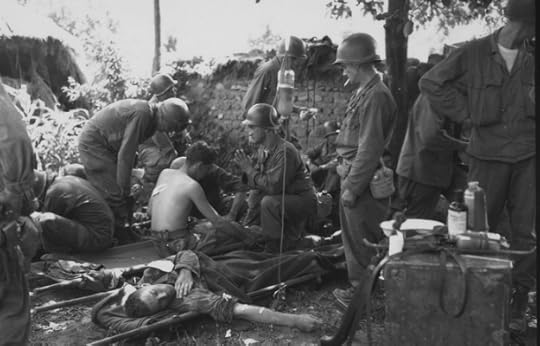
This new pope continues to amaze me. He just makes so
much sense.
Why do I mention this in a defense-oriented blog?
Because the other day, in an interview, he used a military metaphor in
describing his conception of the role of the church: "I see the church as a field hospital after
battle." By which he meant, when
someone is wounded and suffering, you don't fret about his cholesterol levels.
Later in the same interview he
discussed some of his favorite music and films. He singled out Rome, Open City, made in 1945 about the last days of German rule there during
World War II. It is a terrific film. Do yourself a favor: Order the pizza, open
a bottle of zinfandel or sangiovese, and watch it.
What would it be like if other
major organizations got similarly fresh, common sense thinking at the top?
Imagine if the NRA came out and said, "You know, it really is time to do
something about gun violence, and here is a plan we are reluctantly embracing."
Or if American professional sports banned anyone ever convicted of a felony or
a violent crime. Or if we managed to get corporations out of financing
political campaigns. Or if Congress made the rich pay their fair share in
taxes.... Well, I can dream.
(HT to Mr. Andrew Sullivan)
Sh*t NATO leaders say
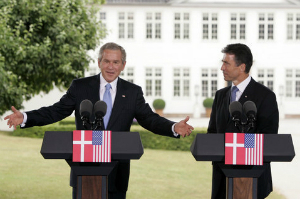
I see Anders Fogh Rasmussen, the
secretary general of NATO, is urging European members to spend more on defense. This is something that NATO secretary generals
have been saying for at least 20 years. I covered a lot of their press
conferences, knowing that what they said was meaningless, or worse. Then I went
out for a good dinner in Brussels, feeling a bit guilty and glad the food was
on an expense account.
Just for fun, why
not have a NATO secretary try calling for the organization's members
to spend less on defense? It couldn't
hurt.
Meanwhile, speaking
of NATO, Canadians like Steve Saideman (a sometime reader of this blog, and a
likely fan of that definitive new book on Bush and Cheney) are getting suspicious about the Americans peddling them overpriced fighter planes.
Fivecoat's response in Parameters to me: Look more at causation than correlation
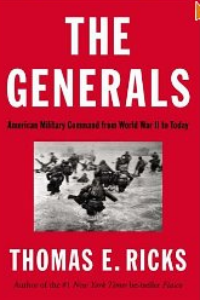
As promised:
Thomas
Ricks's book The Generals did a superb job at generating discussion across the
military on the merits of American generalship since World War II. My article,
"American Landpower and Modern US Generalship" in the Winter-Spring 2013
edition of Parameters, was my attempt to add depth to the dialogue about
the major generals who led division-sized formations in Iraq and Afghanistan
since 9/11.
To be
sure, the article is not all encompassing. Although the post-9/11 group of
major generals is a small data set, it is almost one-third the size of the
World War II cohort and will continue to grow while the U.S. military assists
the Afghan government's counterinsurgency operations for the next several
years. Strictly speaking, it might not be significant by the mathematical
definition, but the division commanders of Iraq and Afghanistan are a notable
group in the historical sense. While I concede the mathematical limitations of
the evidence presented in the article, there is enough hard evidence to allow
us to move beyond questions of correlation and to discuss the matter of
causation, which, in the end, is far more important.
I
acknowledge Mr. Ricks's questioning whether military organizations should
place a premium on reducing disruption. In forming my thoughts on the adverse
outcomes of firings, intellectually I drew upon literature studying similar
experiences in business and professional sports. During a year as a battalion
commander in Afghanistan, I (and I'm sure my higher headquarters) wrestled with
how to improve the performance of subordinate units in an extremely ambiguous
environment. Reliefs rarely seemed the best way forward for my unit or our
counterinsurgency campaign. There is a finer line to be drawn on this measure
than Ricks concedes.
Thanks again for the opportunity to
contribute to the discussion. I hope others are able to expand on and
contribute to the conversation.
Thomas E. Ricks's Blog
- Thomas E. Ricks's profile
- 437 followers



